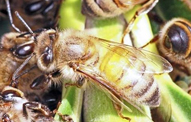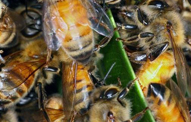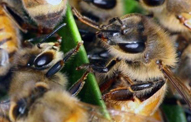Africanized Honey Bee Facts
- Location: Central America, Mexico, central and southern Florida, Tennessee and Texas.
In the mid-1950's, twenty-six African honey bee queens, imported to Brazil from South Africa escaped with swarms of local worker bees from Dr. Warwick Kerr’s experimental facility near São Paulo, establishing renegade colonies of Africanized bees in Central America, Mexico and Texas.
Africanized honey bees don’t look any different than European honey bees, but the evil twins of our most important pollinator have killed over 1,000 people since their escape in 1957, stinging ten times more per victim than European bees.
The US first encountered Africanized bees in the 1990's. However, global warming poses threats to northern states as Africanized bees, swarming more often and readily interbreeding with native bee species, cause experts to believe rising winter temperatures could allow Africanized bees to establish colonies in the Northern Pacific and Midwest regions of the United States.
Africanized bees were found in Kerr’s experiment to produce more honey when bred with European honey bees, Africanized bees’ temperaments pose problems for beekeepers and US apiculture as a whole. While bees aren’t known to attack without provocation, Africanized honey bees react faster and with more much force than European honey bees. Also, Africanized bees’ venom is no more potent than other bees, as is commonly believed. But, because Africanized honey bees attack in greater numbers and with more intensity than other honey bees, often pursuing their victims for a long distance, Africanized bees gained the reputation of “killer bees.”




